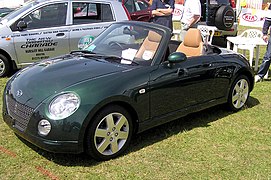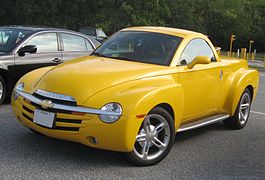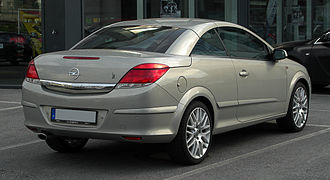Retractable hardtop

A retractable hardtop — also known as "coupé convertible" or "coupé cabriolet" — is a car with an automatically operated, self-storing hardtop, as opposed to the folding textile-based roof used by traditional convertible cars.
Improved climate control and security benefits are traded against increased mechanical complexity, cost, weight, and often reduced luggage capacity.
A 2006 New York Times article suggested the retractable hardtop might herald the demise of the textile-roofed convertible,[1] and a 2007 Wall Street Journal article suggested "more and more convertibles are eschewing soft cloth tops in favor of sophisticated folding metal roofs, making them practical in all climates, year-round."[2]
History
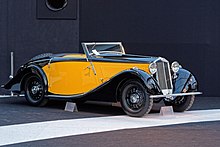

1922 Ben P. Ellerbeck was granted a patent (U.S. No. 1,379,906 on 31 May 1921) for a retractable hardtop roof design for cars.[3] He developed several scale models for the 1922 Automobile Body Builders Exhibition in New York City.[4] In 1922, he modified a 1919 Hudson Super Six roadster with his manually operated gear and spring "flip top" system.[3] It allowed unimpeded use of the rumble seat even with the top down.[5] The design was not put into production.[6]
1931 Georges Paulin made his idea public by applying for a patent on a detachable hard roof design that could ultimately be moved and stowed automatically in a car's rear luggage compartment, under a reverse-hinged rear-deck lid.[7]
1932 The French patent system granted Paulin patent number 733.380 for his Eclipse roof system on 5 July 1932.[7]
1934 Paulin's Eclipse retractable hard roof [1] was first presented on the Peugeot 401D Éclipse Décapotable, a low convertible coupé.[8][9] In 1933, Paulin showed his designs to premier coachbuilder Marcel Pourtout, who hired him as lead designer, and in 1934 they equipped first a Peugeot 401D, followed by a 601C, with "Eclipse" roofs and bodywork, on chassis provided by Emile Darl'mat. The same year, a Lancia Belna, a French-built Lancia Augusta, was also built as an Eclipse.[10]
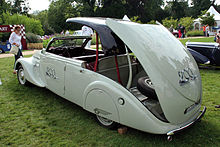
1935 Peugeot purchased Paulin's patent, and introduced the first factory production, power-operated, retractable hardtop in 1935, the "402BL Éclipse Décapotable",[11][12] of which some 470 were built.[1] Pourtout build custom examples, designed by Paulin, on other makes including Delage and Panhard as well as the "Eclipse" coupé-convertibles based on the Peugeot 301, 401, 601, 302, and 402.[1]

1941 Chrysler introduced a retractable hardtop concept car, the Chrysler Thunderbolt.[13][14]
1947 American Playboy Automobile Company marketed one of the first series produced convertibles, with a retractable roof consisting of more than one section. Ninety-seven production models were made until the company's bankruptcy in 1951.[15]
1953 Ford Motor Company spent an estimated US$2 million (US$22,776,119 in 2023 dollars[16]) to engineer a Continental Mark II with a servo-operated retractable roof. The concept was rejected for cost and marketing reasons.[5] Engineering work was used by Ford for the retractable mechanism in their 1957 through 1959 flagship Ford Fairlane 500 Skyliner.
1955 Brothers Ed and Jim Gaylord showed a prototype at the 1955 Paris Motor Show, but the car failed to reach production.[17]
1956 After working for 4,000 hours and investing $100 in the whole car, Raymond P. Meyette built a one-piece power-operated hardtop convertible using a 1952 Nash Ambassador chassis.[18]
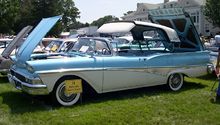
1957 Ford introduced the Fairlane 500 Skyliner in the United States. Further development of the 1953 Continental Mark II retractable proposal cost an estimated US$18 million (US$195,270,142 in 2023 dollars[16]).[19] The Skyliner was a halo car with little luggage space and was priced double the baseline Ford sedan. A total of 48,394 were built from 1957 until 1959.[5] Its mechanism contained ten power relays, ten limit switches, four lock motors, three drive motors, eight circuit breakers, as well as 610 feet (190 m) of electrical wire.[5] It could raise or lower the top in about 40 seconds. The retractable top was noted for its complexity and usual reliability in the pre-transistor era.[20][21]
1989 Toyota introduced a retractable hardtop, the MZ20 Soarer Aerocabin. The car featured an electric folding hardtop and was marketed as a two-seater with a cargo area behind the front seats. Production was 500 units.
1995 The Mitsubishi GTO Spyder by ASC was marketed in the U.S.[6] The design was further popularized by such cars as the 1996 Mercedes-Benz SLK.[1] and 2001 Peugeot 206 CC.
2006 Peugeot presented a concept four-door retractable hardtop convertible, the Peugeot 407 Macarena.[22] Produced by French coachbuilding specialist Heuliez, the Macarena's top folded in about 30 seconds.[22] It has a reinforcing beam behind the front seats incorporating LCD screens into the crossmember for the rear passengers.[22]
Construction
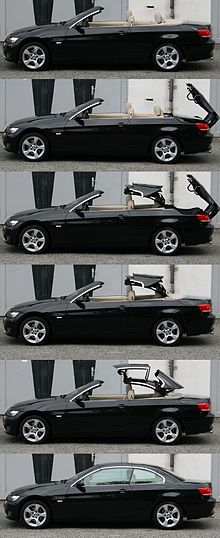
Retractable hardtops are commonly made from between two and five sections of metal or plastic and often rely on complex dual-hinged trunk/boot lids that enable the trunk lid to both receive the retracting top from the front and also receive parcels or luggage from the rear. The trunk also often includes a divider mechanism to prevent the loading of luggage that would conflict with the operation of the hardtop.
Variations
- The Volkswagen Eos features a five-segment retractable roof where one section is an independently sliding transparent sunroof.[2]
- The Mercedes SL hardtop features a glass section that rotates during retraction to provide a more compact "stack."
- The third-generation Mazda MX-5 was available with an optional power retractable hardtop in place of the standard folding-textile soft-top. Compared to the regular soft-top, the hardtop weighed 77 lb (35 kg) more. It did not reduce cargo capacity.[23] The hardtop roof was polycarbonate and manufactured by the German firm Webasto.[24]
- The retractable hardtop used on the Chrysler Sebring (and its successor the Chrysler 200) was marketed alongside a soft-top. According to development engineer Dave Lauzun, the Karmann-made tops were installed into identical body designs and used the same automatic tonneau cover, luggage divider, and luggage space.[25] The retractable version featured an underbody cross-brace not included in the softtop.
Comparison with soft tops
The retractable hardtop's advantages include:
- More weatherly when the roof is raised
- More secure than fabric tops[2][26]
- Increased structural rigidity
- May enable consolidation/simplification of a manufacturer's car lineup; for example, the BMW Z4 (E89) was offered only as a coupé-convertible (hardtop), compared to the preceding E85 generation that had separate coupé and cabriolet (soft-top) variants.
The retractable hardtop's disadvantages include:
- Higher initial cost
- Increased mechanical complexity
- Potentially diminished passenger and trunk space compared to a soft-top convertible.[27][28]
- Higher weight and center of gravity than soft-top convertibles, potentially reducing handling.[29][27][28]
- Potential need for more than minimum clearance while operating the hardtop. For example, the Volvo C70 requires 6.5 feet (2 m) of vertical clearance during operation,[30] the Cadillac XLR requires 6 ft 10+1⁄2 in (2 m) of vertical clearance and the Mercedes SLK's trunk lid extends rearward while lowering or lifting the top.
List of retractable hardtop models
Gallery
- Mazda Miata Power Retractable Hard Top (PRHT) c. 2007, with polycarbonate hardtop[23]
- Daihatsu Copen c. 2001, a retractable hardtop in the Japanese Kei class
- Ford Focus CC c. 2006, its retractable hardtop final assembly by Pininfarina
- Volkswagen Eos c. 2007, the five-segment top includes a sliding sunroof made by OASys
- Opel Astra Twintop (2005-2012), three-part roof stores in the upper half of the boot for luggage space below it
References
- ^ a b c d e Sass, Rob (10 December 2006). "New Again: The Hideaway Hardtop". The New York Times. Archived from the original on 29 October 2015. Retrieved 6 March 2011.
- ^ a b c Vella, Matt (26 April 2007). "Convertibles with Hard Tops". The Wall Street Journal. Retrieved 3 February 2014.
- ^ a b Gosden, W.E. (April 1979). "The first Fliptop? Ellerbeck had a Better Idea". Special Interest Autos. pp. 20–21.
- ^ Creager, Reid (February 2022). "Going Like 100: the convertible celebrates a milestone birthday, all started by an uncelebrated inventor" (PDF). Inventors Digest. Vol. 38, no. 2. pp. 14–16. Retrieved 14 January 2024.
- ^ a b c d Nerad, Jack. "Ford Skyliner". Driving Today. Archived from the original on 21 February 2014. Retrieved 13 January 2024.
- ^ a b "History, Revival". Retractable Hardtop Online. Retrieved 3 February 2014.
- ^ a b Buchanan, James. "The Story of Lancia, Paulin and John Moir". redroom.com. Archived from the original on 26 July 2011. Retrieved 13 January 2024.
- ^ Brierley, Brooks T. (17 June 2001). "1935 Peugeot Model 401D Eclipse: The first retractable hardtop". autoweek.com. Retrieved 31 March 2021.
- ^ "From the Zero to the Eclipse". Peugeot.mainspot.net. Archived from the original on 17 January 2010. Retrieved 31 March 2021.
- ^ "1934 Lancia Belna Eclipse by Pourtout". Retrieved 9 June 2019.
- ^ "Disappearing Top On Auto Worked By Push Button". Popular Mechanics. Vol. 63, no. 2. February 1935. p. 253. Retrieved 14 August 2013.
- ^ "Latest Foreign Auto Has Disappearing Top". Popular Mechanics. Vol. 65, no. 1. January 1936. p. 53. Retrieved 14 August 2013.
- ^ Auto Editors of Consumer Guide (29 November 2007). "1941 Chrysler Thunderbolt Roadster". auto.howstuffworks.com. Retrieved 15 January 2024.
- ^ "Vanderbilt Cup Races - Blog - Mystery Friday Foto #4 Solved: The 1941 Chrysler Thunderbolt concept car with links to Tucker 1044 and 1937 Chrysler's Chrysler". vanderbiltcupraces.com. 30 January 2023. Retrieved 15 January 2024.
- ^ Radu, Vlad (6 June 2022). "Remembering the Playboy, America's First Production Convertible With a Retractable Hardtop". autoevolution. Retrieved 15 January 2024.
- ^ a b 1634–1699: McCusker, J. J. (1997). How Much Is That in Real Money? A Historical Price Index for Use as a Deflator of Money Values in the Economy of the United States: Addenda et Corrigenda (PDF). American Antiquarian Society. 1700–1799: McCusker, J. J. (1992). How Much Is That in Real Money? A Historical Price Index for Use as a Deflator of Money Values in the Economy of the United States (PDF). American Antiquarian Society. 1800–present: Federal Reserve Bank of Minneapolis. "Consumer Price Index (estimate) 1800–". Retrieved 29 February 2024.
- ^ Auto Editors of Consumer Guide (13 November 2007). "1950 Gaylord concept cars". auto.howstuffworks.com. Archived from the original on 17 January 2021. Retrieved 13 January 2024.
- ^ Sand, George X. (December 1956). "They told him it could not be built - so he built it himself: A Hardtop Convertible". Popular Mechanics. Vol. 106, no. 6. pp. 138–139. Retrieved 13 January 2024.
- ^ Severson, Aaron (26 April 2009). "Raising the Roof: The Ford Skyliner 'Retrac'". Ate Up With Motor. Retrieved 9 December 2016.
- ^ Willson, Quentin (1995). The Ultimate Classic Car Book. DK Publishing. ISBN 0-7894-0159-2.
- ^ Auto Editors of Consumer Guide (20 July 2007). "1957-1959 Ford Fairlane 500 Skyliner". auto.howstuffworks.com. Retrieved 14 August 2013.
- ^ a b c "¡Hey, Macarena! Heuliez Creates an Open-Top Peugeot 407". Edmunds. 28 January 2006. Archived from the original on 19 December 2006.
- ^ a b Vaughn, Mark (10 September 2006). "2007 Mazda MX-5 Miata Power Retractable Hardtop". autoweek.com. Retrieved 6 March 2011.
- ^ "2007 Mazda MX-5 Miata Hardtop". Car and Driver. 1 September 2006. Retrieved 28 June 2018.
- ^ Lauzun, Dave. "2008 Chrysler Sebring Convertible". Autonetwork.com. Archived from the original on 21 December 2021. Retrieved 3 February 2014.
- ^ "Great Drive: Luxury Hardtop Convertible Comparison". Automobile. August 2009. Retrieved 14 August 2013.
- ^ a b St. Antoine, Arthur (May 2010). "Luxury Convertible Comparison: 2010 Audi A5 vs 2010 BMW 335i vs 2009 Infiniti G37 vs 2010 Lexus IS 350". Motor Trend. Retrieved 3 February 2014.
- ^ a b Swan, Tony (June 2007). "2007 VW Eos vs. Audi A4, BMW 328i, Volvo C70, Saab 9-3 – Comparison Tests". caranddriver.com. Retrieved 3 February 2014.
- ^ Swan, Tony (March 2010). "2010 Audi A5 2.0T Quattro vs. 2010 BMW 328i, 2009 Infiniti G37, 2010 Lexus IS350C – Comparison Tests". Car and Driver. Retrieved 3 February 2014.
- ^ "2007 Volvo C70". volvocars.com, C70 owner documentation, Page 93. Retrieved 3 February 2014.
- ^ Keebler, Jack (August 2002). "2004 Cadillac XLR". Motor Trend. Retrieved 6 March 2011.



![Mazda Miata Power Retractable Hard Top (PRHT) c. 2007, with polycarbonate hardtop[23]](https://upload.wikimedia.org/wikipedia/commons/thumb/c/c4/Mazda_MX-5_hardtop.jpg/320px-Mazda_MX-5_hardtop.jpg)
![Cadillac XLR c. 2007, aluminum hardtop made by a joint venture of Mercedes-Benz and Porsche[31]](https://upload.wikimedia.org/wikipedia/commons/thumb/9/97/Cadillac_XLR_2006.jpg/257px-Cadillac_XLR_2006.jpg)
